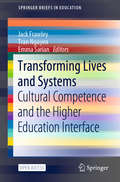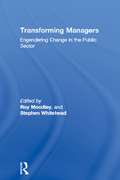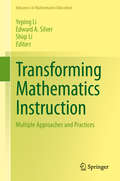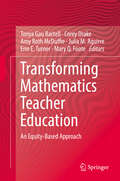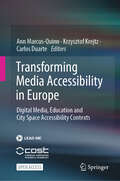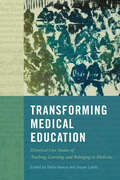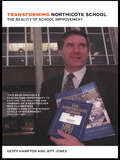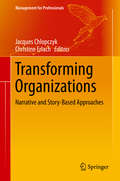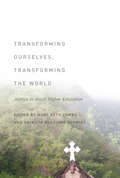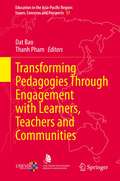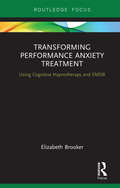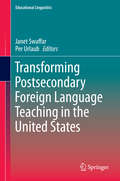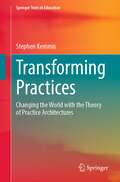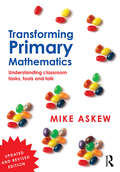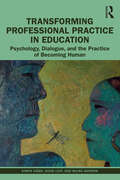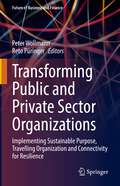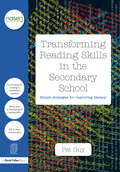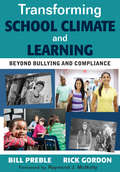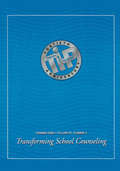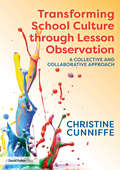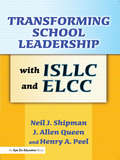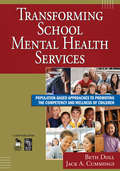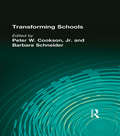- Table View
- List View
Transforming Lives and Systems: Cultural Competence and the Higher Education Interface (SpringerBriefs in Education)
by Jack Frawley Tran Nguyen Emma SarianThis open access book explores the transformative experiences of participants in the University of Sydney’s National Centre for Cultural Competence (NCCC) programs. The establishment of the NCCC was viewed as a critical point of departure for developing an institution-wide agenda of cultural competence. The NCCC’s work since its inception reflects efforts to lay important foundations for cultural change at the University. With the ultimate aim of establishing cultural competence as an agent for transformational change and social justice education, the NCCC has steadily expanded its research and teaching work both within and beyond the University of Sydney. Further, it has developed foundational resources to support and encourage University staff to integrate cultural competence philosophy and pedagogy in their curricula, teaching and research. This includes the ability to engage meaningfully with the cultures, histories and contemporary issues in Aboriginal and Torres Strait Islander communities. The NCCC programs have been designed to encourage participants to learn about who they are and how they can positively impact the transformational change the University has begun.The book presents participants’ reflections on their experiences at the organisational and personal level. Readers will gain insights into a range of topics including cultural competence, communities of practice, policy implementation, and transformative leadership at the interface between higher education and professional lives.
Transforming Managers: Engendering Change in the Public Sector (Gender, Change, And Society Ser.)
by Roy Moodley Stephen WhiteheadIn the 1990s, considerable changes in the political and social world have impacted on the character of both public and private organizations. At a time of increased uncertainty and insecurity in these organizations, new ways of managing and being managed have emerged. Recognising that organizational life is part reflective and determined by dominant social discourses, factors of gender will inevitably be central to the dynamics of organizational change. This book addresses theoretical ideas and mythologies in the examination of gendered organizations. The need to examine men in relation to family, law and society in general is growing, and this book extends this interrogation to work and organizational life. It will be of interest to students in management studies, public sector management and those involved in public policy making as well as students and academics within gender studies and sociology.
Transforming Mathematics Instruction
by Yeping Li Edward A. Silver Shiqi LiThis book surveys and examines different approaches and practices that contribute to the changes in mathematics instruction, including (1) innovative approaches that bring direct changes in classroom instructional practices, (2) curriculum reforms that introduce changes in content and requirements in classroom instruction, and (3) approaches in mathematics teacher education that aim to improve teachers' expertise and practices. It also surveys relevant theory and methodology development in studying and assessing mathematics instruction. Classroom instruction is commonly seen as one of the key factors contributing to students' learning of mathematics, but much remains to be understood about teachers' instructional practices that lead to the development and enactment of effective classroom instruction, and approaches and practices developed and used to transform classroom instruction in different education systems. Transforming Mathematics Instruction is organized to help readers learn not only from reading individual chapters, but also from reading across chapters and sections to explore broader themes, including: - Identifying what is important in mathematics for teaching and learning emphasized in different approaches; - Exploring how students' learning is considered and facilitated through different approaches and practices; - Understanding the nature of various approaches that are valued in different systems and cultural contexts; - Probing culturally valued approaches in identifying and evaluating effective instructional practices. The book brings new research and insights into multiple approaches and practices for transforming mathematics instruction to the international community of mathematics education, with 25 chapters and four section prefaces contributed by 56 scholars from 10 different education systems. This rich collection is indispensable reading for mathematics educators, researchers, teacher educators, curriculum developers, and graduate students interested in learning about different instructional practices, approaches for instructional transformation, and research in different education systems. It will help readers to reflect on approaches and practices that are useful for instructional changes in their own education systems, and also inspire them to identify and further explore new areas of research and program development in improving mathematics teaching and learning.
Transforming Mathematics Teacher Education: An Equity-Based Approach
by Erin E. Turner Tonya Gau Bartell Corey Drake Amy Roth McDuffie Julia M. Aguirre Mary Q. FooteThis book builds on the Teachers Empowered to Advance Change in Mathematics (TEACH Math) project, which was an initiative that sought to develop a new generation of preK-8 mathematics teachers to connect mathematics, children’s mathematical thinking, and community and family knowledge in mathematics instruction – or what we have come to call children’s multiple mathematical knowledge bases in mathematics instruction, with an explicit focus on equity. Much of the work involved in the TEACH Math project included the development of three instructional modules for preK-8 mathematics methods courses to support the project’s goals. These activities were used and refined over eight semesters, and in Fall 2014 shared at a dissemination conference with other mathematics teacher educators from a variety of universities across the United States. Chapter contributions represent diverse program and geographical contexts and teach prospective and practicing teachers from a variety of socioeconomic and ethnic backgrounds, in particular providing accounts of supports, challenges, and tensions in implementing equity-based mathematics teacher education. The chapters supply rich evidence and illustrative examples of how other mathematics teacher educators and professional developers might make the modules work for their unique practices, courses, workshops, and prospective teachers/teachers. It promises to be an important resource for offering guidance and examples to those working with prospective teachers of mathematics who want to create positive, culturally responsive, and equity-based mathematics experiences for our nation’s youth.
Transforming Media Accessibility in Europe: Digital Media, Education and City Space Accessibility Contexts
by Carlos Duarte Ann Marcus-Quinn Krzysztof KrejtzIn a rapidly evolving digital landscape, accessibility in media has emerged as a crucial frontier for inclusion, equality, and knowledge democracy. The present edited volume "Transforming Media Accessibility in Europe: Digital Media, Education and City Space Accessibility Contexts" is a comprehensive exploration of technological, societal, psychological, and legal aspects of media accessibility in Europe. It offers a comprehensive roadmap for navigating the multifaceted landscape of media accessibility. Through compelling experimental studies, case studies, and forward-looking insights, it elucidates the transformative potential of accessible media across diverse sectors, including education, culture, and smart cities. Crafted as a collaborative effort under the COST (European Cooperation in Science and Technology) LEAD-ME Action (CA19142), this book unites the expertise of researchers, educators, and practitioners. This is an open access publication.
Transforming Medical Education: Historical Case Studies of Teaching, Learning, and Belonging in Medicine (McGill-Queen's/Associated Medical Services Studies in the History of Medicine, Health, and Society)
by Delia Gavrus and Susan LambIn recent decades, researchers have studied the cultures of medicine and the ways in which context and identity shape both individual experiences and structural barriers in medical education. The essays in this collection offer new insights into the deep histories of these processes, across time and around the globe.Transforming Medical Education compiles twenty-one historical case studies that foreground processes of learning, teaching, and defining medical communities in educational contexts. The chapters are organized around the themes of knowledge transmission, social justice, identity, pedagogy, and the surprising affinities between medical and historical practice. By juxtaposing original research on diverse geographies and eras – from medieval Japan to twentieth-century Canada, and from colonial Cameroon to early Republican China – the volume disrupts traditional historiographies of medical education by making room for schools of medicine for revolutionaries, digital cadavers, emotional medical students, and the world’s first mandatory Indigenous community placement in an accredited medical curriculum. This unique collection of international scholarship honours historian, physician, and professor Jacalyn Duffin for her outstanding contributions to the history of medicine and medical education.An invaluable scholarly resource and teaching tool, Transforming Medical Education offers a provocative study of what it means to teach, learn, and belong in medicine.
Transforming Northicote School: The Reality Of School Improvement
by Jeff Jones Geoff HamptonIn February 1994 Northicote School, situated in a deprived area of Wolverhampton, was the first in the country to be named and shamed, OfSTED called the school 'appalling in almost every way'.Then Geoff Hampton took over as head - five years later he was awarded a knighthood for transforming the fortunes of this failing school; and its pupils.This book pulls out the key points from the five year programme and shares successful strategies with other heads, governors and teachers. Full of clear advice and guidance fro new and experienced headteachers, containing sections on: Managing the reactions of staff and pupils to an unfavourable OfStED report Finding a positive route to improvement _ Action planning _ Staff and pupil issues _ The role of the headteacher _ Changing the culture of the school _ Involving the wider community _ _ This story is inspirational but it is grounded in the practical realities facing headteachers and senior management teams in education today. The reader cannot fail to be motivated by what has been achieved.
Transforming Organizations: Narrative and Story-Based Approaches (Management for Professionals)
by Jacques Chlopczyk Christine ErlachAchieving true change and innovation depends on our ability to re-imagine and re-author the futures we want our organizations to have – and to open new perspectives and new ways of thinking, being and doing in the process. Narrative approaches and storytelling are powerful tools that can help us create a new future for branding and marketing, change, leadership, organizational learning and development. Gathering contributions by scholars and practitioners from various disciplines, this book provides a unique overview of an emerging field of practice in organizations and communities. Rooted in a narrative conceptual framework, the respective papers describe a broad range of trans-disciplinary applications, tools and methods for effectively working with stories.
Transforming Ourselves, Transforming the World: Justice in Jesuit Higher Education
by Mary Beth Combs Patricia Ruggiano SchmidtTransforming Ourselves, Transforming the World is an insightful collection that articulates how Jesuit colleges and universities create an educational community energized to transform the lives of its students, faculty, and administrators and to equip them to transform a broken world. The essays are rooted in Pedro Arrupe’s ideal of forming men and women for others and inspired by Peter-Hans Kolvenbach’s October 2000 address at Santa Clara in which he identified three areas where the promotion of justice may be manifested in our institutions: formation and learning, research and teaching, and our way of proceeding.Using the three areas laid out in Fr. Kolvenbach’s address as its organizing structure, this stimulating volume addresses the following challenges: How do we promote student life experiences and service? How does interdisciplinary collaborative research promote teaching and reflection? How do our institutions exemplify justice in their daily practices? Introductory pieces by internationally acclaimed authors such as Rev. Dean Brackley, S.J.; David J. O’Brien; Lisa Sowle Cahill; and Rev. Stephen A. Privett, S.J., pave the way for a range of smart and highly creative essays that illustrate and honor the scholarship, teaching, and service that have developed out of a commitment to the ideals of Jesuit higher education. The topics covered span disciplines and fields from the arts to engineering, from nursing to political science and law. The essays offer numerous examples of engaged pedagogy, which as Rev. Brackley points out fits squarely with Jesuit pedagogy: insertion programs, community-based learning, study abroad, internships, clinical placements, and other forms of interacting with the poor and with cultures other than our own. This book not only illustrates the dynamic growth of Jesuit education but critically identifies key challenges for educators, such as: How can we better address issues of race in our teaching and learning? Are we educating in nonviolence? How can we make the college or university “greener”? How can we evoke a desire for the faith that does justice?Transforming Ourselves, Transforming the World is an indispensable volume that has the potential to act as an academic facilitator for the promotion of justice within not only Jesuit schools but all schools of higher education.
Transforming Pedagogies Through Engagement with Learners, Teachers and Communities (Education in the Asia-Pacific Region: Issues, Concerns and Prospects #57)
by Dat Bao Thanh PhamThis book identifies three types of influential forces that pose challenges to innovations: socio-cultural dynamics, teacher individuality, and local circumstances. It uses languages, cultural traits, and intellectual heritages in the Asia-Pacific region as an example to show the resistance to Western-based pedagogies due to disparities between the innovations and these local heritages. It reveals personal and professional values that teachers hold and how these values, while seemingly supporting creative ideologies, happen to prevent them from incorporating innovations in their practices. The book discusses how informal educational activities and services that a society possesses could impede pedagogical innovations. There is, therefore, a need for institutions and educators to develop a positive relationship between these phenomena and teaching innovations.
Transforming Performance Anxiety Treatment: Using Cognitive Hypnotherapy and EMDR (Routledge Focus on Mental Health)
by Elizabeth BrookerTransforming Performance Anxiety Treatment: Using Cognitive Hypnotherapy and EMDR offers a much needed and different approach to this issue, using two psychodynamic therapies which work to bring about rapid and long-lasting change. Using nine reflexive case studies, the author examines two little used interventions, cognitive hypnotherapy (CH) and eye movement desensitisation and reprocessing (EMDR). The basic theories of cognitive anxiety and the emotions that underpin this condition are explored. The principles and protocols of CH and EMDR are explained, and how these psychodynamic therapies are adapted to effect permanent change. The first book to examine these treatments for this condition, Transforming Performance Anxiety Treatment will be of interest for practitioners and therapists in training, as well as educators, professionals, and therapists working within competitive sports.
Transforming Postsecondary Foreign Language Teaching in the United States
by Janet Swaffar Per UrlaubThis volume addresses critical challenges and issues facing foreign language departments in colleges and universities across the U. S. It presents the insights of individuals who have built or are in the process of building foreign language curricula during a major transition period in postsecondary institutions. The authors of this volume come from various language departments and institutional experience from across the U. S. , including private and public postsecondary foreign language teachers, researchers and administrators. The chapters address issues and provide templates for curricular change at all learning levels. The five sections of this book explore: Changing Perceptions about Foreign Language Learning; The Case for a Multi-literacy FL Curriculum in Concept and Assessment Praxis; Curricular Transformations: Historical Hurdles and Faculty Heuristics; Rethinking the Graduate Curriculum; Foreign Languages' Integration into the Interdisciplinary University. "This thought-provoking and timely volume addresses the question of how historic and current disciplinary, institutional and political conditions affect curricular transformation in collegiate foreign language programs. Responding to the issues raised in the 2007 MLA Report, this collection of nine essays presents a diversity of curricular models and approaches from different theoretical perspectives focusing on the integration of language and content. The book will undoubtedly be of great interest to a broad audience, such as foreign language educators, curriculum designers, administrators, graduate students and researchers. " Nelleke Van Deusen-Scholl, Yale College, CT, USA.
Transforming Practices: Changing the World with the Theory of Practice Architectures (Springer Texts in Education)
by Stephen KemmisThis textbook shows how people can and do transform the world through transforming their practices and the practice architectures that shape them, and contributes to contemporary practice theory. It provides an authoritative, comprehensive, and contemporary account of the theory of practice architectures, illustrated through examples drawn from years of research by participants in the Pedagogy, Education, and Praxis international research network from Australia, New Zealand, Finland, Norway, Sweden, the Netherlands, Colombia, and the Caribbean. Its content provides a variety of resources for researchers who are new to research using the theory of practice architectures. It includes tables to assist with the analysis of practices, and provides clear examples to aid understanding and application. This textbook provides readers with a thorough grounding in the theory and ways the theory of practice architectures has been used in investigations of social and educational practice.
Transforming Primary Mathematics: Understanding classroom tasks, tools and talk
by Mike AskewFully updated to reflect the new curriculum, the revised edition of Transforming Primary Mathematics sets out key theories and cutting-edge research in the field to enable teachers to take a fresh look at how they teach mathematics. The book encourages teachers to reflect on their own beliefs and values about mathematics, and asks them to question whether their current methods meet the needs of all learners, and the challenge of having high expectations for all. It provides clear, practical approaches to help implement fundamental change in classroom environments, and offers motivational teaching styles to ensure meaningful mathematics learning. Chapters take an inspiring, sometimes controversial, and often unconventional look at the subject of mathematics, by: endorsing the use of a 'new mathematics' - one based on problem solving, modelling, inquiry and reasoning, not on abstract rules, memorising, and regurgitation arguing that there is more to maths teaching than 'death by a thousand worksheets' challenging norms, such as the practice of sorting children into sets based on their perceived mathematical ability asking whether mathematical ability is innate or a result of social practices examining what a 'mastery' approach might entail highlighting the role of variation in supporting learning advocating an environment where teachers are encouraged to take risks. Transforming Primary Mathematics is for all primary school teachers who want to make mathematics welcoming, engaging, inclusive and successful.
Transforming Primary QTS
by Debbie Simpson Mike ToynThe changing landscape of primary teaching requires trainees to consider learning and teaching in new ways. This book supports trainee teachers working towards primary QTS in teaching primary ICT across all areas of the curriculum. Taking a truly cross-curricular approach, the text highlights meaningful links across the curriculum, while embracing the latest thinking and current good practice. A chapter on social networking and e-safety is included, giving essential guidance on this topical issue. This is followed by a section aimed at strengthening trainees' own skills and subject knowledge in ICT. Interactive activities and case studies link theory to practice and encourage the reader to rethink how ICT is taught in primary schools. This second edition is linked to the 2012 Teachers' Standards. About the Transforming Primary QTS series This series reflects the new creative way schools are begining to teach, taking a fresh approach to supporting trainees as they work towards prmary QTS. Titles provide fully up tp date resources focused on teaching a more integrated and inclusive curriculum, and texts draw out meaningful and explicit cross curricular links.
Transforming Primary QTS: Primary Professional Studies
by Alice HansenThe new National Curriculum for primary schools brings with it significant changes to the way 5-11 year old children are taught. This book supports trainee teachers working towards primary QTS in learning how to teach the new National Curriculum. It covers all the key aspects of teaching and learning that student teachers need to know to successfully achieve the QTS Standards. The book covers al areas of teaching and learning through four distinct sections exploring the new curriculum, the developing child, the developing teacher and teaching skills. Comprehensive teaching notes and a range of interactive features make essential links between theory and practice. The book supports the core professional studies components of all ITT courses with, among others, chapters on planning, assessment, behaviour, including all learners, safeguarding children and curriculum approaches. This second edition is linked to the 2012 Teachers' Standards. About the Transforming QTS Series This series reflects the new creative way schools are begining to teach, taking a fresh approach to supporting trainees as they work towards primary QTS. Titles provide fully up to date resources focused on teaching a more integrated and inclusive curriculum, and texts draw out meaningful and explicit cross curricular links.
Transforming Professional Practice in Education: Psychology, Dialogue, and the Practice of Becoming Human
by Wilma Barrow David Leat Simon GibbsFocusing on teaching and learning in educational institutions, Transforming Professional Practice in Education explores the value of enhancing dialogue to improve both professional relationships and practices. Offering a critique of the present state of education, this book focuses on the belief that education should be about being and becoming human, and how everyone implicated in education learns through dialogue with others, and that humans are relational beings who develop and flourish within reciprocal relationships. The authors offer an alternative to reductive and systems-driven procedures by building a case for psychologically robust educational methods. They provide an authoritative and theoretically well-grounded rationale for psychological approaches to professional practice to promote debate about the purposes of education. Rich with practical examples, the chapters discuss the risks of professional isolation, ethics vs morals in education, the nature of relationships in education, and interventions that would ground these ideas in practice. This book is important reading for clinical, educational, and other applied psychologists. It is also of value to those within educational institutions, such as SENDCos and those responsible for the safety of children and young people, who are seeking to develop their understanding of how dialogue enhances professional encounters, and who are looking for alternative ways of engaging with education, which improve mental health and wellbeing.
Transforming Public and Private Sector Organizations: Implementing Sustainable Purpose, Travelling Organization and Connectivity for Resilience (Future of Business and Finance)
by Peter Wollmann Reto PüringerThe book addresses an explicit demand expressed in a large number of C-Suite interviews: managing significant transformations in the private and public sector. The book describes what types of transformation have to be reflected, why transformations are crucial in our days, the triggers they have, and how they might be best managed from a theoretical and practical point of view – technically and with all people-connected soft facts. The book, which contains numerous use cases, is written by an international community of practitioners, experts, and academics from different geographies, countries, public and private organizations, industries, and cultures, which guarantees the comprehensiveness and richness of the developed insights and the value of the presented use cases.
Transforming Reading Skills in the Secondary School: Simple strategies for improving literacy (nasen spotlight)
by Pat GuyTransforming Reading Skills in the Secondary School is a commonsense text designed to help practitioners working in a mainstream context. The book suggests ways to develop the underlying skills necessary for good reading through multiple pathways such as mainstream subject lessons, individual and small group support sessions, whole school initiatives, the use of reading mentors and home-school liaison opportunities. Brimming with ideas and activities, Pat Guy explores a variety of different aspects of reading, including: how reading is taught and why it is such an important skill for the individual how to motivate the reluctant reader the role played by the mainstream & specialist teacher underlying problems pupils may face how to increase parental involvement reasons why a pupil’s comprehension might be limited the role of the School Librarian the relevance to reading of vocabulary and general knowledge. Anyone wanting to develop the reading skills of secondary pupils who struggle will find this a resource they return to time and time again.
Transforming School Climate and Learning: Beyond Bullying and Compliance
by William K. Preble Rick M. GordonCreating safe schools from the inside out This book details a comprehensive process for empowering students and teachers as school improvement leaders and “experts.” Bill Preble and Rick Gordon explain how schools can use the SafeMeasures™ collaborative action research process to: Collect and analyze school climate data Develop improvement goals Create exciting and inspiring action plans to dramatically improve their school’s climate and student engagement Each chapter features success stories from real schools, strategies and implementation activities, and book study questions that help all stakeholders transform both their school climate and student learning.
Transforming School Counseling: A Special Issue of Theory Into Practice
by Susan Jones SearsFirst Published in 2005. This is Volume 41 of the Theory Into Practice series, with focus on Transforming School Counseling, featuring guest editor Susan Jones Sears. This issue showcases a close examination of educational practices in schools serving low-income and minority students with disturbing trends. The articles discuss the findings that students in high-poverty and high-minority schools see little connection between what is being taught and a better future for themselves. Also contained are a variety of proposed reasons to explain why many school counselors are not considered to be change agents.
Transforming School Culture through Lesson Observation: A Collective and Collaborative Approach
by Christine CunniffeThis book sets out a three-stage programme for lesson observation showing how a collaborative whole-school approach can transform the culture of the staffroom and improve outcomes for pupils. Focusing on the emotional environment of the classroom, the relationships between teachers and pupils, and teaching and learning outcomes, it will enable schools to provide a consistent approach to lesson observation where good practice can be celebrated and shared. Revealing the positive impact of the programme on pupils’ engagement and exam results, co-operation between departments and teacher wellbeing, the book: Provides clear guidance on implementing the programme and adapting it for different contexts. Shows how data can be used for both Ofsted and Independent Schools Inspectorate (ISI) inspection documentation. Adresses key issues such as culture, staff psychological contracts, the emotional environment of the school and leadership development. If you are looking to make real impact within your school and bring about change for the better, the three-stage lesson observation programme is the tool for you. This innovative approach brings consistency, parity and fairness to lesson observation creating a secure and safe environment in which pupils can learn and teachers can teach.
Transforming School Leadership with ISLLC and ELCC
by J. Allen Queen Henry Peel Neil ShipmanAuthoritative and practical, this book is co-authored by Neil Shipman, former ISLLC Director. It provides kknowledge and tools to help principals-in-training and practitioners apply the ISLLC and ELCC standards in their schools. Each chapter contains a research-based discussion and practical applications of the standard, along with suggested activities, assignments, and case studies.
Transforming School Mental Health Services: Population-Based Approaches to Promoting the Competency and Wellness of Children
by Dr Beth Doll Jack A. CummingsProvides a comprehensive ten-step sequence for implementing population-based services that improve wellness and academic success for individual students and entire schools, and offers suggestions for engaging parents.
Transforming Schools
by Peter W. Cookson Barbara SchneiderFirst Published in 1995. Routledge is an imprint of Taylor & Francis, an informa company.
